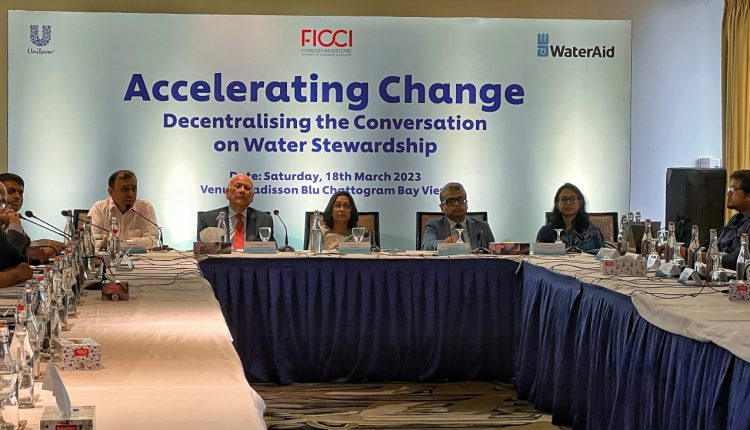The Dhaka Times Desk Industrial pollution is increasing rapidly in the commercial capital of Chittagong. The amount of water polluted due to industrial waste is increasing so much that it is posing a serious threat to fresh surface water sources.

The ground water level in Chittagong has decreased by 20 meters in the last 40 years. Kalurghat industrial area of Chittagong is facing various problems due to this acute water shortage. A concerted effort is needed to solve this problem.
On the occasion of World Water Day, a joint initiative of Unilever Bangladesh Limited, Foreign Investors' Chamber of Commerce and Industry (FICCI) and WaterAid Bangladesh held at Radisson Blu Chittagong Bay View on March 18 titled 'Accelerating Change: Decentralizing the Conversation on Water Stewardship' These issues came up in the round table discussion.
Along with WaterAid Country Director Hasin Jahan in the round table discussion, the main discussants of the event included Unilever Bangladesh Limited Managing Director and Chief Executive Officer Javed Akhtar and FICCI Director and Korean Export Processing Zone (KEPZ) Chairman Jahangir Sadat. Professor of Bangladesh University of Engineering (BUET) and director of ITN-BUET. Tanveer Ahmed presented the results of Rapid Situation Assessment of Kalurghat Heavy Industrial Area and relevant recommendations. Moreover, the event was attended by various prominent industry representatives, academicians and honorable representatives of service-oriented government institutions.
The assessment shows that industrial pollution in Chittagong – particularly water pollution due to industrial waste – is increasing, posing a serious threat to surface water sources. Dr. Tanveer Ahmed recommended the Department of Environment to issue precautionary directives to industrial establishments before water sources reach the point of complete destruction. He further added that a detailed monitoring of the respective industrial areas is necessary to take informed decisions.
The speakers emphasized on better coordination among the industrial establishments of Kalurghat and consideration of collective welfare above business interests to ensure water safety and maintain quality. Along with this, stakeholders from the respective sectors also discussed various effective approaches and strategies for water management.
WaterAid Bangladesh Country Director Hasin Jahan said, “Multinational organizations are creating effective examples of water management in their industrial operations. We should all learn from these examples. It will help pave the way for evidence-based advocacy and dialogue with governments recognizing the private sector's contribution to achieving Sustainable Development Goal 6. Also, such industry-partnerships will also create opportunities for medium and small scale industries to learn sustainable and improved water management techniques”.
Javed Akhtar, Managing Director and Chief Executive Officer of Unilever Bangladesh Limited, said, “Chittagong, the commercial capital of Bangladesh, is the heart of various industries, which depend heavily on water. We also want uninterrupted supply of water for production and consumption of our products. So UBL, FICCI and WaterAid have chosen the heavy industrial areas of Chittagong and Kalurghat to launch a dialogue and platform, through which it will be easier for us to plan and work together.
FICCI Director and Korean Export Processing Zone (KEPZ) Chairman Jahangir Sadat said, “FICCI member institutions and other reputed institutions based in Chittagong are committed to protecting water resources. Organizations are taking innovative steps in their manufacturing and supply operations, which can be considered as best practices for the industry. I am hopeful that this roundtable dialogue will be a milestone in ensuring sustainable water management systems for businesses in the country”. News bulletin.
Things to do to prevent Corona virus
# try to stay at home all the time.
# Follow the rules and use mask when going out for emergency.
# three-layer cloth mask can be washed if desired.
# wash clothes after coming home from outside. Or hang it without shaking for at least four hours.
# Wash hands thoroughly (for at least 20 seconds) with soap or liquid before coming outside.
# plastic PPE or eyes, face, head must be washed thoroughly with detergent and dried after one use.
# Wear PPE made of cloth or clean as described.
# Use a head cap that completely covers the hair.
# Those who have sneeze cough should follow all the rules promulgated by the government. Also, wash hands as directed before and after handling food items, keys, switches, mice, remote controls, mobiles, watches, computer desks, TVs, etc. and after using the bathroom. Those who have dry hands use Moisture after washing their hands. Soap or hand liquid can be used. Why can this virus remain in the crackle (cracked part) of dry hands? Avoid using highly alkaline soaps or detergents.


